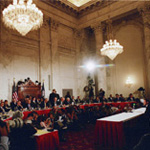
It’s the year 2018. The president has nominated you to serve as his science adviser. You’re seated before a committee of Senators. They’ll make an initial call on whether or not you should be confirmed. One asks, then another (with variations on the same theme): Is climate change real? What should we do about it?[1]
Sitting there, with the lights up, the video running, the cameras clicking, you know two things of a certainty.
First, the people who sent you here, the people who nominated you, have expectations about your answer. They’ve asked you the same questions – repeatedly – in interviewing you for the job, and they’ve heard, mulled over, and reacted to your answers. They’ve made clear what attributes (substance, stance, tone) they consider preconditions for the job, not just for the hearing but for the remainder of your tenure. The community you hail from, that is, your fellow scientists from your discipline, your fellow faculty members, your family – the people who shaped you, made you who you are – they have expectations too. Everyone wants to hear you to say certain things in a certain way.
The intersection of all these expectations is essentially a null set.
Second, you know that whatever you say, however you say it, your answer will serve as a springboard for criticism from every quarter – from the Senators present, from the scientific community, from the news media. What’s more, much of what those people will say has already been predetermined – rather than having much to do with what you will actually say. In part, that’s because we human beings don’t always just believe what we see. To a great extent we see what we believe. We find what we’re looking for.
To emphasize: the substance and the tone of the tweets, the blogposts, the op-eds, won’t just be a reaction to what you say. It may have been planned in advance. Even if not, it’ll reflect the writers’ and speakers’ upbringing, their previous life experiences, their employers’ or constituencies’ expectations and demands – the folks social scientists these days label their “culture” or “tribe.” (Full disclosure, though there shouldn’t be any lingering doubt; that applies to these LOTRW posts as well. Take them with a grain of salt.)
How do you respond?
Before we turn to that question, it’s worth noting that things haven’t changed all that much. Case in point: some 2000 years ago there was another conversation, really a confirmation hearing of a sort, considered so remarkable by those “in the room when it happened” that they carefully, meticulously, passed the transcript down through the ages. Very few documents have survived from that period, but this one did. It mattered that much.
It’s c. 30/33A.D.Then the Pharisees went out and laid plans to trap him in his words. They sent their disciples to him along with the Herodians. “Teacher,” they said, “we know that you are a man of integrity and that you teach the way of God in accordance with the truth. You aren’t swayed by others, because you pay no attention to who they are. Tell us then, what is your opinion? Is it right to pay the imperial tax to Caesar or not?”
But Jesus, knowing their evil intent, said, “You hypocrites, why are you trying to trap me? Show me the coin used for paying the tax.” They brought him a denarius, and he asked them, “Whose image is this? And whose inscription?”
“Caesar’s,” they replied.
Then he said to them, “So give back to Caesar what is Caesar’s, and to God what is God’s.”
When they heard this, they were amazed. So they left him and went away.[2]
They were indeed amazed… and so are we, even millennia later. What an answer!
____________________
Again, how do you respond?
A final observation. There’s little joy in debate. Not for you, certainly, but for not for anyone else in the hearing room either. Fact is, any satisfaction from scoring debating points is fleeting at best. The antibodies you build up on the other side endure.
But it’s possible to make it clear, perhaps not in so many words, but through tone, that you’re not interested in adding to the country’s polarization, fractiousness, division, distrust, and pain. There’s more than enough of that to go around. But if the people in the room want to join in a search for truth (including but not limited to what does scientific evidence say about climate change? What mitigation and coping options are available to us?) – you’re all in.
This is not a new thought. The best nominees move discussions in this direction, and the most satisfying confirmation hearings wind up on a similar positive note. That guy from 2000 years ago? He said,
“You shall know the truth, and truth will set you free.”[3]
Let freedom ring.
____________________
[1]Note that there are many other such vexing questions at the intersection of science and policy, touching on when life begins, creation and evolution, the health implications of nanotechnology, genetically modified foods, vaccinations, and more.
[2]Matthew 22:15-22 NIV. Of course, this was a confirmation hearing of a different kind. Jesus made a simple claim, that he was the son of God. He had quite a resume: wise insights, healings, even bringing a friend back to life. But based on this hearing, and others, people were troubled. The concern was non-partisan. Not one, but all parties – Romans, the Jewish leaders, the people – agreed he should be put to death, and carried out the execution. But there’s been continuing disagreement about what happened next.

This is a great post, Bill.
Thanks,Jon!